Main navigation
The Neuro-Ophthalmology Program at the University of Iowa bridges the fields of ophthalmology and neurology through diagnosis and management of patients with neurological disorders that affect vision and eye movements.
Approximately 3,000 clinical neuro-ophthalmology patients are evaluated in the Neuro-Ophthalmology service each year. The evaluations include the entire range of afferent, efferent and pupil abnormalities thereby providing a diverse and challenging fellowship experience.
To achieve these goals, the fellow will have to acquire a firm grasp of visual and ocular motor neuroanatomy, the neuropathology of vision and eye movement, the theory, practice, and interpretation of perimetry, electrophysiology of the visual system, and imaging of the eye (including optical coherence tomography). The fellow will also acquire expertise in the reading of CT and MR scans, and achieve a working understanding of the autonomic physiology and pharmacology of the eye.
Clinical Expertise
During the fellowship period, the fellow sees patients daily with the residents from 8:45 a.m. to 5 p.m. in the Neuro-ophthalmology Clinic. This clinic is staffed by the neuro-ophthalmology faculty. Every patient is presented to staff and all charts are signed by staff, and the staff are the "doctors of record" for all patients seen in this clinic. The neuro-ophthalmology faculty will examine every patient and will discuss with the fellow each patient that they see. Time is usually allotted to pursue clinical research during the course of the year.
Purpose and Objectives
The fellowship is designed to provide additional training in neuro-ophthalmology for an ophthalmologist or neurologist who has completed an approved residency. The fellow will be expected:
- To acquire a special expertise in the diagnosis and management of neuro-ophthalmic problems,
- To be able to conduct clinical research in neuro-ophthalmology, and
- To learn how to be an effective teacher of neuro-ophthalmology.
Training and Education
Daily working/teaching rounds are held at 7:30-8 a.m. by Drs. Kardon, Linton, Thurtell, and Wall. These are attended by the fellow, resident(s) (usually two) who are taking a three-month rotation in neuro-ophthalmology, medical students and neurology or neurosurgery residents who are completing a one month rotation on the service. During neuro-ophthalmology daily rounds, the previous day’s clinic patients are discussed, including review and interpretation of visual fields, imaging of the eye and brain, and mechanisms of the disease causing the patient’s problem. Neuro-ophthalmology rounds are an integral part of our fellowship training and is followed by our Ophthalmology Department’s daily Grand Rounds (Monday, Wednesday, Thursday, and Friday from 8-8:45 a.m.). Fellows are expected to make regular interesting case presentations at Department Morning Grand Rounds. The Neuro-ophthalmology service also conducts monthly Neuro-radiology conferences with the Neuro-radiology faculty to discuss the most interesting cases from the previous month who had imaging studies relevant to their diagnosis.
Throughout the year, fellows are encouraged to improve their public speaking and teaching skills by presenting interesting cases to the entire department at morning rounds (see above; 8–8:45 a.m. daily) and at regularly scheduled neuro-ophthalmic demonstrations and inter-departmental conferences. The fellow will take neuro-ophthalmology call every other week with the faculty as back up. In general, it is unusual to be called in after hours.
Engage in Research
Through the year, the fellow is required to undertake an investigative project which can be completed and submitted for publication before the fellowship is over. This is usually a new observation, a case series or report, a prospective study, or a review; it may be in any area of neuro-ophthalmology. The fellow usually presents this research at the annual North American Neuro-ophthalmology Meeting.
The Neuro-ophthalmology Faculty are very active in research funded by the National Institute of Health, the Department of Defense, and the Department of Veterans Affairs, and spend a portion of their schedule on externally funded research. They are committed to enhancing the fellowship training experience by mentoring and guiding research investigations.
Learn more about our Faculty research projects.
Board Certification Requirements
While Ophthalmology, as a specialty, is board certified, Ophthalmology subspecialty fellowships are not board certified. Visit the American Board of Ophthalmology for specifics on board certification requirements.
By the numbers
The Fellowship is for a 12-month period (unless other arrangements are made). An optional second year is available for those particularly interested in clinical investigations.
One fellow is accepted at a time (with occasional exceptions, more than one fellow may be accepted, when additional funding is available).
The University of Iowa Neuro-Ophthalmology Fellowship program is compliant with Association of University Professors of Ophthalmology (AUPO) Fellowship Compliance Committee (FCC) process described at the link below.
Salary and Benefits Summary
Salary is based on a post-graduate training level and is set by the Graduate Medical Education (GME) office. Most fellow physicians are paid at the PGY-5 level.
- Competitive Stipends
- Comprehensive medical, dental, hospitalization and pharmacy benefits for residents/fellows and their dependents
- Vacation each year: 3 weeks, for specific information Paid Time Off and Leave Information
